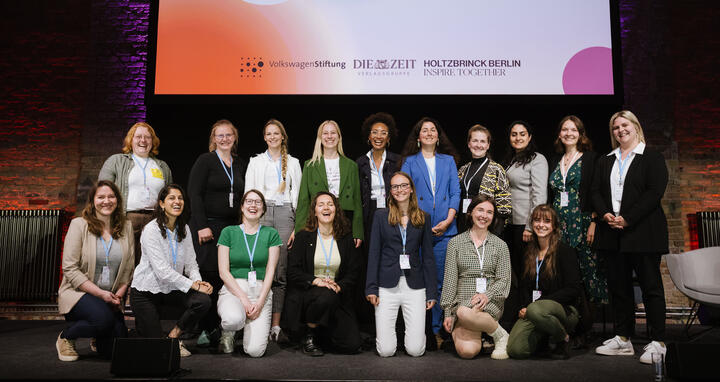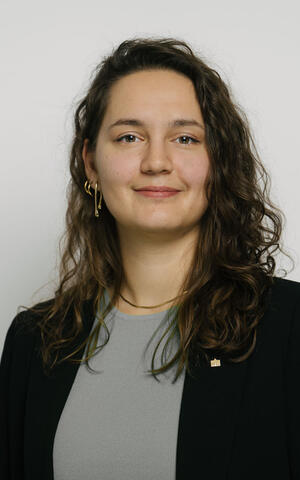More visibility for female scientists
In Arabic, Zia means “the shining one.” For the Zeit publishing group, the word is a mission: Its one-year program “Zia – Visible Women in Science” aims to give young women in science greater visibility. For one year, around 25 fellows have the opportunity to connect and exchange ideas with each other and with experienced female scientists who serve as role models. There are also workshops and online sessions on a variety of topics.
As part of the Max Delbrück Center’s partnership with Zia, each year one of our young female researchers is guaranteed acceptance into the program. The next round will kick-off with an online event in October. All participants will meet in person for the first-time during Berlin Science Week and the Falling Walls Conference, where they will also meet with the Zia program role models.
Female scientists at the beginning of their careers can apply between July 1 and August 31. Evangelia Nathanail, who is investigating protein malfunctions in mitochondria for her doctoral thesis in the Structural Biology of Membrane-Associated Processes lab led by Professor Oliver Daumke, is a current fellow. In the interview below, the Greek native, who previously worked at the University of Oxford and at the Free University of Berlin, discusses how the fellowship has benefitted her why colleagues should apply.
Similar perspectives
Why did you decide to apply to the Zia program?
Evangelia Nathanail
EN: For young women in science at the start of their careers, it’s often difficult to find networks specifically tailored to them – networks made up of experienced female scientists who can guide and support us. This is a critical point in our careers, where we have to decide what matters most to us personally. We feel the weight of these decisions and all the limitations that may come with them. Of course, I’m very grateful for the mentoring I receive from non-female colleagues as well, but I still wanted to hear voices and see perspectives similar to mine. That’s why I decided to apply to Zia.
What was the application process like? Was it competitive?
I had actually applied for the 2023/24 fellowship but wasn’t accepted at the time. I now see that as a blessing, since the transition from the third to the fourth year of my PhD changed my own perspective and the value I get from the program.
The Max Delbrück Center is a partner of the Zia program. That significantly improves the chances of acceptance. The internal application process was very straightforward. I would advise anyone interested in Zia to apply without hesitation.
Persistent bias
Do you personally feel disadvantaged as a woman in science?
Sadly, yes. In our discussions — both at Zia and with other non-male colleagues — it becomes clear time and again that prejudice and misogyny are still present in science. They often manifest in subtle but cutting ways — especially when it comes to leadership positions. Traits considered positive in male colleagues are often frowned upon in women: Decisiveness, confidence, and being to-the-point, for example, can labeled as bossy in women. And that’s just a few of the nicer examples I can think of.
Such discrepancies and judgments can discourage women from taking on leadership roles and responsibility, even though we’re just as capable as our male peers. Usually, it’s not enough to be just as good as a male colleague. We women often have to be much better just to be seen as equal and worthy of a seat at the table.
To what extent can the Zia program help change this narrative?
Zia offers an alternative narrative — one in which women are capable of great science and are recognized as such. We all come from different backgrounds, both personally and professionally, but we have one important thing in common: we’re competent and actively pursuing a role in science. Sure, we are all women, but what’s more significant is who we are. Narratives can change people’s perceptions. And I believe Zia makes an important contribution to transforming the discourse and eliminating gender-based bias in science.
Respect and advice
You’ve been in the program for about six months now. What have been the highlights for you so far?
What I’ve enjoyed most are the in-person meetings, where the all the 2024-25 fellows from around the world come together. We’ve built a network based on support, mutual respect, and recognition. I always return from these meetings feeling empowered and motivated. A big part of that is the mentoring I receive – both from the other participants and from the official mentors of the program. All these women are incredibly skilled scientists with fascinating life stories. They listen and offer advice — always with the utmost respect. I’m very grateful for that.
How do you think the program might influence your future career?
Zia has actually changed my own view of the role of women in science. Before joining the program, a future in science sometimes seemed like a fleeting dream. Now I see it as an attainable goal — should I choose to pursue it with all the hard work it entails.
These kinds of reflections have now taken center stage, rather than my doubts about whether I’m capable. Of course, this initial uncertainty wasn’t solely because I identify as a woman. Zia isn’t about boosting the career prospects of women in general — it’s for aspiring female scientists who are looking for mentors and mutual support.
Don’t hesitate
What advice would you give to young female scientists interested in Zia?
First, I would strongly encourage them to apply — even if it doesn’t work out the first time. Second, some events are open to all, such as the first Zia Congress for Women in Science, which recently took place in Berlin and will hopefully be repeated in the coming years. Seeking mentors and advice is one of the best steps we can take to feel like active members of the scientific community. Conferences like these can be a big move in that direction. And finally, we shouldn’t hesitate to reach out to colleagues who inspire us. In my experience, well-regarded and perhaps initially intimidating people often turn out to be the kindest.
Interview: Anke Brodmerkel







